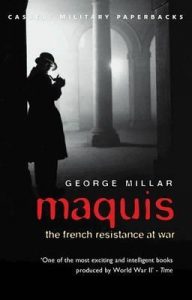What I’m Reading: “Maquis” by George Millar
Two weeks ago, I posted on some of the reasons I enjoy reading older and downright old books. The reason I don’t often pass by firsthand, nonfiction accounts of war and wartime experience, bears on Reason 3 of that post (historical perspective) — but may also count as its own reason. In short, because I’m currently writing heroic fantasy, with war at the heart of its subject matter, I am always interested to read the real, lived experience of soldiers, operatives and spies, and civilians.

If I have gleaned one consistent theme from such reading it’s that, by and large, war is not heroic. It’s brutal, banal, messy, muddled, and chaotic, but very rarely heroic. When heroism does occur, it’s very often understated and/or so matter-of-fact that it’s easy to miss.
All of which is consistent with my reading of Maquis. In terms of context, the author, George Millar (1910 – 2005) was a British soldier who escaped from a German POW camp and made it back to the UK, then parachuted into France with the SOE in 1944 to operate behind enemy lines. He was highly decorated, receiving the DSO, the Military Cross, the Légion d’Honneur, and the Croix de Guerre avec Palmes.
Maquis is Millar’s firsthand account of his experience organising and working with the French Resistance, known as the Maquis. The work Millar undertook was helping organize local resistance cells, training the resistance volunteers in sabotage (which the Germans apparently called terrorism), particularly explosives, and organising and leading sabotage missions. Although first published in 1945 and successful then, the edition I read was from 1956 and not so highly redacted in terms of wartime sensitivities and secrets.

The book is very readable and insightful, but not at all heroic. If anything, it’s the opposite. Although the brutality, banality, mess, muddle, and not infrequent chaos are present, I would not call it a bleak or “grimdark” read. If anything, the accounts are matter-of-fact and one of the aspects that leap out is the degree of mistakes, carelessness, and outright folly that both resistance and operatives get away with. Except when they don’t, of course—and another element that is quite clear, albeit as subtext, is that of luck in eluding capture and death.
Beyond being a firsthand account, the character portraits of those George Millar meets and works with, either directly or indirectly, are part of what makes Maquis an interesting read. As regards Millar himself, while at the heart of the narrative he doesn’t indulge in boasting or bravado. He is clearly coolheaded and also something of a maverick, but not so much so that he can’t work with others or take orders when required.
Another, reasonably strong impression that comes through is that he wasn’t driven by emotion, particularly retribution (in fact he seems to perceive it as often – but not always – counterproductive) and so can express respect for the Germans, despite being the enemy, where their conduct merits it, as well as for his maquisard allies.
If firsthand accounts of war experience are of interest, then I believe Maquis will prove a worthwhile read. Similar narratives include The White Mouse by Nancy Wake, Eastern Approaches by Fitzroy Maclean, and Popski’s Private Army by Vladimir Peniakoff.
—

 Previous “Reading Older Books” Posts:
Previous “Reading Older Books” Posts:
- Reading Older Books
- Prodigal Summer by Barbara Kingsolver
- Amazons II Anthology
- Reasons For Reading Old & Older Books







